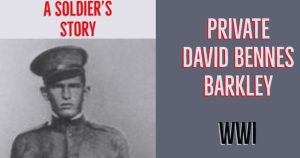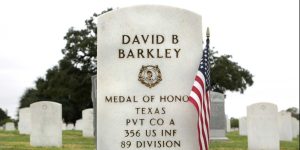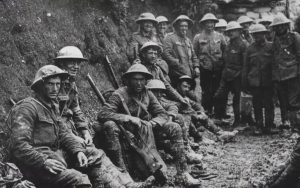David Bennes Barkley, a young man from San Antonio, was celebrated for his swimming abilities, often seen at the San Pedro and Brackenridge Park pools, effortlessly covering 300 yards without a break. His skill in the water foreshadowed a courageous act in the final days of World War I, when he swam the icy Meuse River in France to gather vital intelligence—a mission that claimed his life and nearly took the life of his fellow soldier.

As the world commemorates the 100th anniversary of the Armistice that ended World War I, the Army honors Barkley as the first San Antonian to receive the Medal of Honor. The son of a career soldier and a mother of Mexican descent, Barkley became a legendary figure in the years following the war, although little is known about his life. His story, often forgotten, only resurfaces occasionally in newspaper articles.
Remarkably, just months before Barkley became a hero, a man with the same name was facing a decade-long military prison sentence for desertion—a detail seldom mentioned in accounts of his heroism.
“What he did before doesn’t matter,” says Bryan P. Howard, curator of the Fort Sam Houston Museum, who helped create an exhibit about Barkley at the Institute of Texan Cultures. “What matters is that he performed a brave act for his country and died for it.”

Pvt. David Barkley’s Medal of Honor citation reads: “When information was needed regarding enemy positions on the opposite side of the Meuse River, Pvt. Barkley and another soldier volunteered without hesitation to swim across and reconnoiter the area. Despite enemy attempts to stop them, they reached the other side, gathered the information, and began their return. Tragically, Barkley was seized by cramps and drowned before he could reach safety.”
Barkley was one of nearly 200,000 Texans who served in World War I from August 1917 until the war’s end, and one of 5,100 who did not make it home. Little is known about his life before he undertook the perilous swim across the Meuse. His father, Joseph Barkley, was a career Army soldier who often left his wife, Antonia Cantu Barkley, and their children behind. From a young age, David aspired to be a soldier, often mimicking the sounds of military bugles with a spoon or fork.
When Barkley’s body was brought back to the U.S., it lay in state at the Alamo, a rare honor. At that time, his Hispanic heritage was not acknowledged—a detail that only appeared in newspapers before World War II. Some mistakenly identified him as the first Hispanic recipient of the Medal of Honor, a title that actually belongs to Cpl. Joseph H. De Castro, who earned the distinction for his role in defending Cemetery Ridge during Pickett’s Charge at Gettysburg in 1863.
Barkley’s history is more enigmatic compared to other Medal of Honor recipients from San Antonio. Born in Laredo in 1899, he grew up in San Antonio. He left school at the age of 13 to take on various jobs, including delivering groceries and working as a newsboy for the *San Antonio Light*, where he won a contest that awarded him free clothes.

The spelling of his last name varies in different records. His Medal of Honor citation and Texas National Guard service records spell it “Barkeley,” a variation also found in some newspaper accounts, including those describing how his mother received the Medal of Honor. Other records, however, drop the first “e.”
Some believe that Barkley’s father may have abandoned the family. Joseph Barkley, a career soldier, married Antonia Cantu in 1893 while stationed at Fort Ringgold in the Rio Grande Valley with the 5th Cavalry. Cantu, born in Mexico to German and Mexican parents, was reportedly 15 at the time, though historian Bryan P. Howard believes she was younger. The demanding realities of Army life often left Antonia to raise the children on her own.

